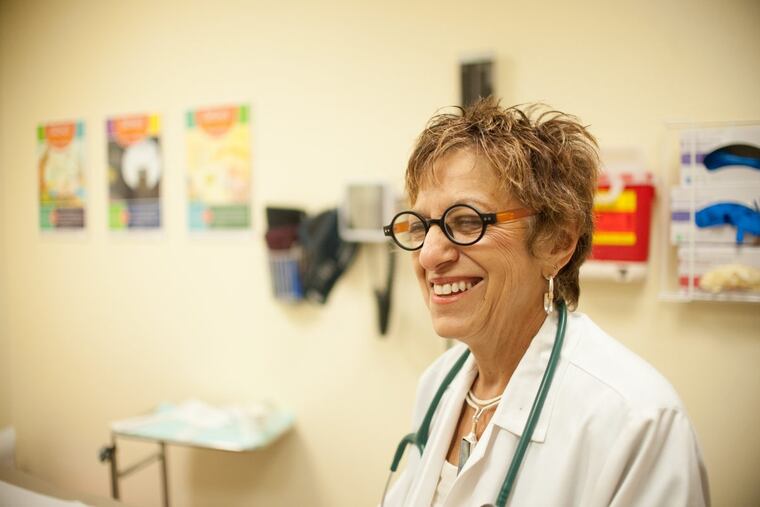Donna Torrisi: Praying for health care for the poor
Most mornings, Donna Torrisi, 66, slices through the water at her pool for 25 laps. The final one is for prayer. And these days, Torrisi, a nurse-practitioner who has spent her career caring for the poor, is praying more than ever.

Stroke by stroke, Donna Torrisi, 67, slices through the water at her pool most mornings, counting the laps … 1, 2, 3, up to 25.
Torrisi, the nurse-practitioner who leads the Family Practice and Counseling Network, the nation's largest nurse-led clinic network for the poor, reserves the last few laps for prayer for her family, for her patients, and for the nation, now on the brink of cutting health care, particularly for the poor.
"In my 25th lap, I pray for the leaders of the country and for health care for everybody," she said. One thing needed, Torrisi explained, is more people understanding how health care works.
"It's abhorrent to me for people not having access to health," she said. "My mother said to me once, `Why do they need health insurance? Can't they just use your centers?' But, Torrisi said, "That's not health insurance. That's access to primary care, but what about everything else? What about if you have some kind of neurological symptoms and need to see a neurologist? Too bad.
"How do you look at someone and say, `I'm sorry, I can't get you a colonoscopy, even though it's recommended at your age, or even though you're having blood in your stool," which could be a sign of cancer?
"It's absurd. It's painful," said Torrisi who still practices a half-day a week to stay in touch with patients. "The whole thing is unethical. When we first started the health center, we had this letterhead, and at the very bottom it said: `Health care is a right, not a privilege.' How poignant is that today?"
What will happen to your clients if you lose some Medicaid funding?
I can tell you what it was like before the Affordable Care Act. One out of four of our patients was uninsured. So we have about 24,000 patients, and about 6,000 were uninsured. Now it's one out of 10 uninsured. So we went from actually about 26 percent, to about 9 percent.
What would happen? Give me an example.
If they came in with a hurt ankle that was all swollen and they needed an X-ray, then we would have a problem. Where do we get them an X-ray that they don't have to pay for? So, we send them to the emergency room. Then there's a really big bill, but they don't charge them at the moment. They just send a bill, and the patients never pay it, so it's an expense on the hospital. Then the patients have huge hospital bills, and they probably end up with a collection agency, and it hurts their credit for their rest of their lives.
You’ve been practicing medicine a long time. What changes have you seen?
People who are 50 years old having the diseases of a 70- or 80-year-old person. That's what you see when you are taking care of people who are very low-income. Stress, smoking, poor eating habits, people living in abusive situations, all that takes a toll.
Is it just poverty?
We're looking at opening a birthing center, so I've been doing some reading on why birth outcomes in Philadelphia are so bad. Some studies show that people who come from African countries, when they come to this country, birth outcomes get worse. It's been blamed on racism. Women who are black and are highly educated and come from an upper socioeconomic class have worse birth outcomes than poor, white women. So it's not all about poverty and access to health care. It's something else.
Many leaders in our community are nurses – Madeline Bell at Children’s Hospital of Philadelphia and Rebecca Rimel at Pew Charitable Trusts. Any theories about that?
Nursing isn't for wimps. You have to really be tough and you have to be really willing to get in there and do anything and see people at their very most vulnerable and take care of their physical bodies when they are the most dependent. Some people say, 'I could never touch a person's sweaty body, or deal with bed pans.' It's not the most fun part of nursing, but I think you have to have a certain amount of courage to actually be with people — people who are dying. It takes a certain internal strength.
DONNA TORRISI:
Home: Bala Cynwyd
Family: Partner, Judith Palmer; children, Jessie Torrisi, 40, Ben Palmer, 31.
Diplomas: Villanova University, nursing; University of Pennsylvania, master's in nursing.
Job interview question: What do you do to take care of yourself?
Why: That person is not going to come to work stressed out, because when you're stressed out, you aren't going to be able to manage yourself and other people well.
FAMILY PRACTICE AND COUNSELING NETWORK:
What: Largest network of nurse-led family health-care clinics in the nation. Provides medical and psychological care.
Served: 23,000 patients in 2016, 100,000 visits.
Where: Five locations, headquarters in East Falls.
Revenues: $25 million total; $19 million from Medicaid, Medicare; $3.8 million in other federal grants.
Employees: 180, including 55 health practitioners.